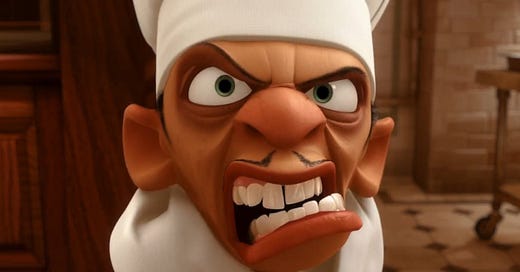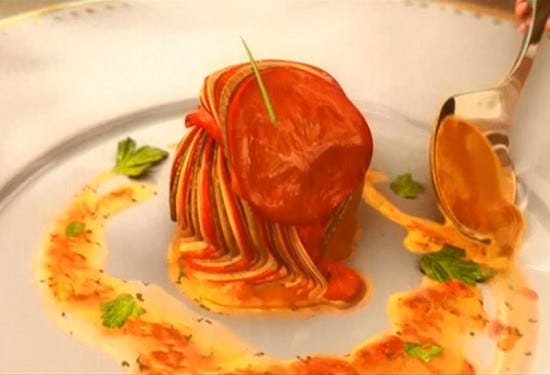“It’s not pronounced rat-tat-too’-yee, it’s rah’-tah-tool”
Sonja, who is French and is the wife of my dear high school friend and former cello stand partner Gabe, took umbrage at my attempt to salvage the four years of Francais, I took at Santa Monica High School. If you ever meet Sonja, you will be intimidated, intrigued and effervesced, even as she eviscerates your linguistic incompetence. Duly noted Sonja. Side note: don’t ever agree to watch a movie with Gabe and Sonja; you will be glued to a six hour plus, black and white, subtitled movie, with a grand total of 12 total cuts throughout the movie. Werckmeister Harmonies is an action movie to them. Sonja will have a documentary coming out shortly, focusing the camera on the relentlessness of time and how our relations serve as the firebreaks against that which is inexorable, the inextinguishable roar of the hour glass.
Ratatouille is the 2007 Pixar film about a rat, Remy, that becomes the head chef in a storied Parisian restaurant “Gusteau’s”. The restaurant’s namesake was a five star chef, a bon vivant and the earnest advocate of the aphorism “anyone can cook.” Gusteau dies of a mysterious broken heart, in the true French manner, but is reincarnated as Remy’s Virgil. Together they descend through Hell’s Kitchen (the sewers of Paris as baptismal purification by water), sublimate past gastronomical purgatory, to be stymied at the pearly gates of haute cuisine. Together, along side friends, sidekicks, family and adversaries, Remy survives his species’ odious reputation to rise to, no position of fame, glory or wealth, but to the realization of his true calling: to become a cook.
The movie’s story, like, much of Pixar’s fare, is a balanced hero’s journey that was neither overtly, ahem, cheesy nor overly dark; a good tale that could be enjoyed by children, with the occasional and casual adult wink. In the end, it felt like the most Pixar of films, a bit self referential as a story of the underdog, an underrat who was committed to quality, simplicity and its own independent vision. After all Pixar, the company, was itself an underdog to the Disney, Dreamworks, ILM Hollywood behemoths, ultimately toppling the incumbents at the box office and the Academy awards, with straightforward, earnest and funny stories.
Ratatouille is also one of Gus’ favorite movies; he saw it as a metaphor for how he thought work in biology should be. In our modern age, where we lionize the geniuses and the chefs, Gus believes in the cook. Cooks are all of us, who humbly combine ingredients, modify a recipe here or there, discover new tastes, give homage to food and others that craft food, and for some, in doing so, create something delicious and orgasmic.
Gus lived his life this same way. When he wasn’t combining various coding domains separated by T2A skip elements, incorporating 3’ untranslated region (UTR) regulation elements, or ensuring proper polyadenylation, he could be found sourcing the right paprika for his paprikash recipe, handed down by his Hungarian forebears. It was not uncommon, on a Thursday afternoon (or any day really), to find him walking the halls of the lab with offerings of Old Fashioneds, sweetened with a homecrafted syrup. He hand pulls his espresso because he craves the subtle control over infusion pressure, unlike me, who prefers the automated ease of drip coffee.
So it’s not surprising that Gus adores this movie. Its messages resonate with and sing to us at Chimera. The movie after all is a work comedy: a professional kitchen, laden with stress, tempo and friction - and yet one with joy!1 The stakes are high; the team delights and celebrates when the customers enjoy the new while racing to keep the restaurant relevant and solvent. Like a restaurant, this is the tale of a biotech company, like Chimera, as well:
preparing new dishes (new therapeutic compounds and innovative technology development)
taste testing (lab experiments and clinical studies)
ensuring customers are not only satisfied, but delighted (patients)
not going out of business (investors, revenue opportunities and pharma partners)
celebrating a good night’s work with wine (celebrating a good’s night work with wine)
The villain / The adversary
Skinner is the villain of the story, a caricatured, self-interested, enterprising former sous-chef of Gasteau. He lucks into a position of power and wields it with the whims of his id, with hallmarks of yelling, sarcasm and greed. Skinner is cloaked in dark triad characteristics, willing to sacrifice the hard-earned reputation of Gusteau’s restaurant, vision and dignity for the sake of self profiteering through ethnically stereotyped, metastatic frozen fast foods. He is raw unbridled capitalism, the villain who will destroy anyone or anything that stands in the way of his own political or pecuniary gains.
Skinner is a cancer, feeding his opportunistic lust and depleting the functioning, organismal restaurant. Remy serves as his foil. Given no credit for being born Rattus norvegicus, he is the unseen but recognized culinary genius. Remy can also be viewed through the lens of cancer immunology, as the rare immune cell clone that locates, activates and proliferates against the tumor to rid the restaurant of Skinner.
Anton Ego is Remy’s adversary and is France’s toughest critic, responsible for depriving Gusteau of his fifth star. But as the adversary, Ego works not against Remy, but alongside in pursuit of more perfect food. Ego states “I don’t like food, I love it. If I don’t love it, I don’t swallow.” It’s almost nothing personal against Remy; Ego’s beef is ultimately with the Skinners of the culinary world. He and Remy share an aspiration for the good, transformative experiences, and dignity in cooking. Their methods differ however: Anton’s approach, unlike Remy’s creative one, is the classic take down; scathing wit and ribaldry.
Sidenote: while feedback can be helpful (a post on this in the future), one should be wary of criticism. Billy Collins, when asked how to introduce poetry to students, advises against criticism:
I ask them to take a poem and hold it up to the light like a color slide or press an ear against its hive. I say drop a mouse into a poem and watch him probe his way out, or walk inside the poem’s room and feel the walls for a light switch. I want them to waterski across the surface of a poem waving at the author’s name on the shore. But all they want to do is tie the poem to a chair with rope and torture a confession out of it. They begin beating it with a hose to find out what it really means.
As Ego is ultimately served the movie’s eponymous peasant’s dish, simply and elegantly, he is transported back to his childhood in an elixir of memories and desires, as if stirring dull roots with spring rain2.
Critic and chef ultimately unite and Ego relents:
In many ways, the work of a critic is easy. We risk very little, yet enjoy a position over those who offer up their work and their selves to our judgment. We thrive on negative criticism, which is fun to write and to read.
But the bitter truth we critics must face is that, in the grand scheme of things, the average piece of junk is probably more meaningful than our criticism designating it so. But there are times when a critic truly risks something, and that is in the discovery and defense of the new. The world is often unkind to new talent, new creations. The new needs friends.
In the past, I have made no secret of my disdain for Chef Gusteau's famous motto: 'Anyone can cook.' But I realize, only now do I truly understand what he meant. Not everyone can become a great artist, but a great artist can come from anywhere.
What does Remy teach us?
Rewatching this 20 year old movie stirs the soul parts and the creative vibrations in me. Art, whether it be culinary, visual or musical are too often viewed as an antipode to science. But their missions are shared: they are performed by their practitioners as expressions and excavations in the pursuit of truth. They require courage (Gusteau: “only the fearless can be great”). They require trustworthy collaborators. They require acts of creation, bringing forth into the world a new existence. The unexpected can be found in all of it, and in doing so yield the new, but sometimes you have to just follow the recipe. And the unexpected can be found in anyone; Anyone can Cook so lend a hand and give an underdog a chance! These truisms will hold whether we be cooks, artists, engineers, biotechnologists, economists, musicians, professional marathon runners or circus performers.
Remy never sought fame, fortune, or accolades that come with being a chef. He merely wanted to be a cook - to serve his friends and family with food, something he was born, as a rat no less, to do - to contribute his verse to the powerful play. This sure sounds like meaning and dignity to me. Doesn’t it to you?
And since Remy asks us to be bold in what we do, I share here a clip of me playing the final theme song from the movie (a bit out of tune and rushed, but hey it was only three takes on my phone), Le Festin. It is my continued attempt to conjoin the sciencey and artsy sides of me:
And Sonja, there’s no way I was going to sing on top of that, what with my French accent and all. Nevertheless je t’aime cheri!
While I have worked in the front end of a restaurant as a bartender, I’ve never been in the back. Fortunately, Jay Danao, one of our earliest Chimerans, and Chef Executive Officer at Chimera, could verify the intensity and satisfaction of the job, having been a cook at Cesar in Berkeley, CA. More at some point about Chez Jay - and his incredible cooking at Chimera!
Borrowed from TS Eliot’s the Waste Land







